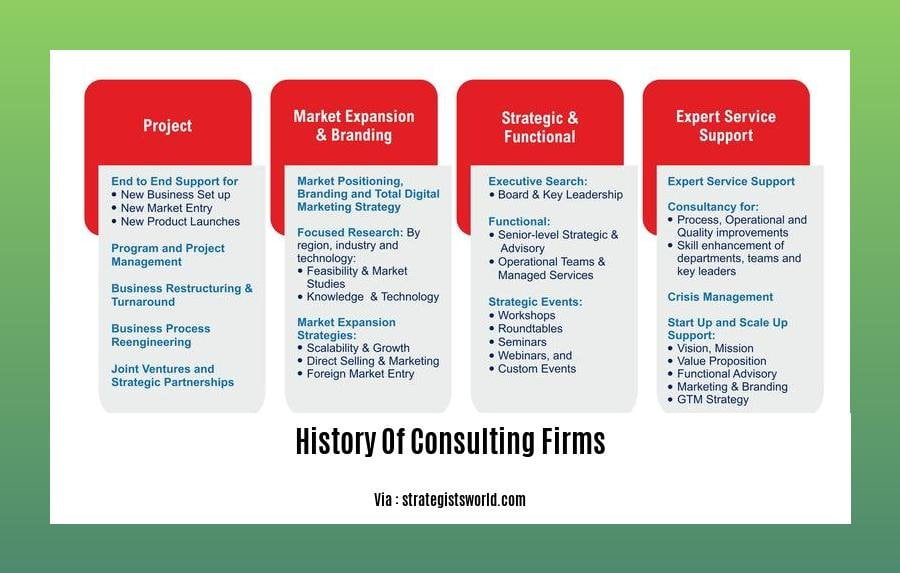– A Glimpse into the History of Consulting Firms: Genesis, Growth, and Future Implications- Consulting firms have played a pivotal role in shaping the business landscape, providing expertise and guidance to organizations seeking to enhance their performance and navigate complex challenges. This article delves into the captivating history of consulting firms, examining their genesis, growth trajectory, and the evolving nature of the consultant-client relationship in the face of technological advancements and changing market dynamics.
Key Takeaways:
- Consulting firms emerged in the early 1900s, with Arthur Little establishing the first in 1886.
- The New Deal regulations in the 1930s led to an increase in demand for management consulting services.
- After World War II, consulting firms expanded their offerings to include strategy and specialization.
- In recent years, consulting firms have focused on supporting clients with digital transformation initiatives.
History Of Consulting Firms

Consulting has come a long way since its humble beginnings in the early 1900s. Let’s journey through time to explore how these firms have evolved and shaped the business landscape:
Emergence and Growth (1900s-1930s)
In the early 1900s, the industrial revolution fueled the need for specialized expertise. Arthur Little established the first consulting business in 1886, pioneering the field. By the 1930s, the New Deal regulation spurred the growth of management consulting as companies sought guidance on reorganizing and streamlining operations.
Post-World War II: Strategy and Specialization
After World War II, consulting firms expanded their services to include business strategy. Specialization became the norm, with firms focusing on specific industries and functional areas. This diversification led to the rise of global consulting giants like McKinsey & Company and Boston Consulting Group.
Digital Transformation
In recent decades, the digital revolution has transformed the consulting industry. Firms have evolved to support clients with digital transformation initiatives, helping them adapt to new technologies and enhance customer experiences. Today, digital consulting is a significant growth area for the industry.
Table: Key Milestones in the History Of Consulting Firms:
| Era | Key Development |
|---|---|
| 1886 | Arthur Little establishes the first consulting business |
| 1930s | Management consulting booms due to New Deal regulation |
| Post-WWII | Firms expand services and specialize |
| Recent | Focus on digital transformation |
Impact and Future Implications
Consulting firms have played a pivotal role in shaping the business world, providing expertise, innovation, and guidance. As technology continues to reshape industries, consulting will likely remain a vital force, helping organizations navigate complex challenges and seize new opportunities.
Learn more about the fascinating History of Navigant Consulting and discover how it has evolved over the years. Explore the rich and intriguing History of Guidehouse and its impact on the consulting industry. Dive into the origins and development of History of Consulting to gain insights into its practices and methodologies.
2,|2 14.
Notable Consulting Firms: Shaping Industries, Driving Innovation

Management consultants emerged as organizations sought increased operational efficiency in the early 20th century. The Great Depression highlighted the need for financial expertise, fueling the growth of consulting firms. Post-war, they expanded into strategy development and specialization, with iconic names like McKinsey & Company and Boston Consulting Group leading the charge.
The digital revolution brought a new era, with firms embracing technology to enhance their services. Today, digital consulting is a major growth area. Consulting firms have played a pivotal role in business development, providing expertise, innovation, and guidance to help organizations navigate change and seize opportunities.
Key Takeaways:
- The industrial revolution and increased demand for operational efficiency gave rise to management consulting.
- Financial consulting gained prominence post-World War II.
- Major strategy frameworks were developed in the 1950s, leading to specialization in the industry.
- Technology has significantly transformed the consulting landscape.
- Consulting firms have expanded into international markets.
- Ethical considerations have shaped the industry, with firms facing scrutiny over potential conflicts of interest.
Sources:
Current State and Future Outlook
The consulting industry is undergoing a period of rapid transformation. The emergence of new technologies, such as artificial intelligence (AI) and machine learning, is changing the way that consulting firms deliver services. In addition, the increasing demand for sustainability and social responsibility is driving consulting firms to develop new solutions that help their clients address these challenges.
Here are some of the key trends that we can expect to see in the consulting industry in the years to come:
- Continued growth in the use of AI and machine learning: AI and machine learning are already being used to automate a variety of tasks in the consulting industry, such as data analysis, report writing, and client management. In the future, we can expect to see even more AI-powered solutions being developed that will help consulting firms to improve their efficiency and effectiveness.
- Increased focus on sustainability and social responsibility: Sustainability and social responsibility are becoming increasingly important to businesses and organizations of all sizes. Consulting firms are responding to this demand by developing new services that help their clients to reduce their environmental impact and improve their social performance.
- Continued growth in the digital consulting market: Digital consulting is a rapidly growing segment of the consulting industry. This type of consulting focuses on helping clients to adopt new digital technologies and transform their businesses using digital tools and strategies.
- Greater collaboration between consulting firms and their clients: Consulting firms are increasingly working closely with their clients to develop and implement solutions that meet their specific needs. This trend is expected to continue in the future, as clients look for consulting firms that can provide them with tailored solutions that can help them achieve their business objectives.
Key Takeaways:
- AI and machine learning are changing the way that consulting firms deliver services.
- Sustainability and social responsibility are becoming increasingly important to clients, and consulting firms are responding by developing new solutions that address these challenges.
- The digital consulting market is growing rapidly, as businesses and organizations look for help with adopting new digital technologies.
- Consulting firms are increasingly working closely with their clients to develop and implement solutions that meet their specific needs.
Relevant URL Sources:
– Consulting
– The Future of Consulting
FAQ
Q1: When did the consulting industry emerge?
A1: The modern consulting industry emerged in the early 1900s, with the establishment of Arthur Little, the world’s first consulting business, in 1886.
Q2: What factors contributed to the growth of consulting firms in the 1930s?
A2: The New Deal regulations, which increased the need for organizational advice, contributed to the significant growth of management consulting firms during this period.
Q3: How did consulting firms evolve after World War II?
A3: Following the war, consulting firms expanded their services to include business strategy and specialization, becoming increasingly involved in strategic planning and decision-making.
Q4: What is the recent focus of consulting firms?
A4: In recent times, consulting firms have shifted their focus towards supporting clients with digital transformation efforts, harnessing technology to improve efficiency and effectiveness.
Q5: What are the ethical considerations that consulting firms face?
A5: Consulting firms face scrutiny and ethical considerations related to potential conflicts of interest, as they often provide advice and recommendations to their clients.
- Discover Famous Doctors: Groundbreaking Advances in Medicine - April 11, 2025
- What Ended the Long Drives?Ranching’s Transformation - April 11, 2025
- How Are Islands Formed: A Comprehensive Guide to Island Genesis - April 11, 2025
















